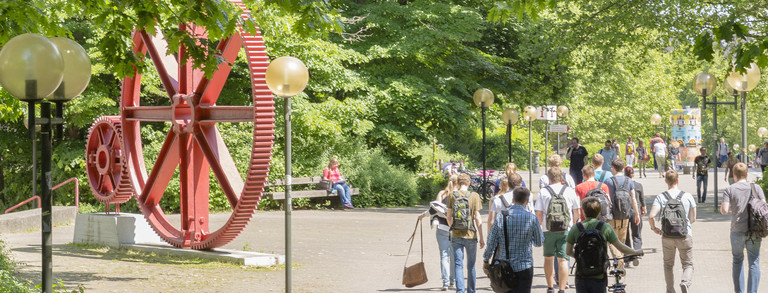Stawal
Project goals
The spatial structure of cities and urban regions and the daily mobility of the urban population are linked in multiple ways. These links are strongly mediated by the households' places of residence and other places relevant for daily activities, particularly the household members' places of work or education. Transport development is therefore closely connected to residential location choices. This in turn affects urban development as a whole, climate emissions, traffic safety, and more. The aim of the project is to better understand (a) how residential location choice – especially moving to a different residence within a region – affects daily travel, (b) which mobility needs, requirements and aspirations affect households' residential location choices, and (c) which role travel attitudes play in the interrelations between mobility and residential location choice.
The project focuses on the following questions:
1. What mechanisms are at work when spatial structures and transport provision at the place of residence influence daily mobility? Which role does the location and accessibility of important destinations (e.g. workplace) play in this context?
2. Conversely, which mobility needs, requirements and aspirations shape residential location choice? Which role do (a) transport provision, (b) subjective travel attitudes, (c) (gender) roles in (couple) households, and (d) multi-local work play in this context?
Practical benefits of the project include strategical and directly applicable scientific knowledge about the transport effects of urban development and residential location choice, households‘ mobility needs, and an integrated, land-saving, climate-friendly urban and transport development.
Methodology
The project takes three complementary perspectives: mobility and location demand, mobility and location supply, and options for policy interventions to manage the interrelations between housing and mobility. Core features are (a) panel surveys among households before and after a residential move about their mobility, life situation and attitudes on mobility and the spatial environment, and (b) cross-sectional surveys among all households in the same neighbourhoods to gain a broader picture of realised mobility and mobility needs in the neighbourhoods. Both survey parts include standardised surveys and qualitative interviews, on the one hand in the form of panel interviews (before/after) with relocating households, on the other hand in the form of focus groups with the neighbourhood population. The surveys and interviews will be implemented in three metropolitan regions, each with distinct spatial and socioeconomic characteristics (Berlin, Munich, Ruhr area). We choose 'model neighbourhoods' that involve distinct mobility concepts and control neighbourhoods without such concepts to evaluate the concepts.
Funding agency
Federal Ministry of Education and Research (Bundesministerium für Bildung und Forschung)
Funding line: MobilitätsZukunftsLabor2050
Reference number: 01UV2082A
Project partners
- TU Dortmund University, Department of Spatial Planning, Research Group of Urban and Regional Sociology, Prof. Dr. Susanne Frank
- German Institute of Urban Affairs (Difu), Department Mobility, Uta Bauer
Policy partners
- Anders Wohnen GmbH, Munich
- Bauwerk Capital GmbH & Co. KG, Munich
- BBU Verband Berlin-Brandenburgischer Wohnungsunternehmen e.V.
- Bundeshauptstadt Berlin, Senatsverwaltung für Umwelt, Verkehr und Klimaschutz
- GdW Bundesverband deutscher Wohnungs- und Immobilienunternehmen e.V., Referat Stadtentwicklung, Wohnungsbau und Raumordnung, Berlin
- Gewobag Wohnungsbau-AG, Berlin
- GEWOBAU Wohnungsgenossenschaft Essen
- Gewofag, Munich
- GWG Städtische Wohnungsgesellschaft München mbH
- HOWOGE Wohnungsbaugesellschaft mbH, Berlin
- Immobilienscout24
- Landeshauptstadt München, Referat für Stadtplanung und Bauordnung
- Spar- und Bauverein eG, Dortmund
- Stadt Dortmund, Stadtplanungs- und Bauordnungsamt
- Stadt Essen, Amt für Stadtplanung und Bauordnung
- Stadt Lünen, Abteilung Stadtplanung
- stattbau münchen GmbH, Munich
- stattbau münchen GmbH, Munich
- SWB-Service- Wohnungsvermietungs- und -baugesellschaft mbH, Mülheim an der Ruhr
- VBW Bauen und Wohnen GmbH, Bochum
- Verband bayerischer Wohnungsunternehmen (VdW Bayern)
- Verband der Wohnungs- und Immobilienwirtschaft Rheinland Westfalen e. V. (VdW-RW), Düsseldorf
- Vereinigung Münchener Wohnungsunternehmen
- Wohnungsbaugenossenschaft Humboldt-Universität eG, Berlin
- Wohnungsbaugenossenschaft Neues Berlin eG
Coopted international partners
- Prof. Dr.-Ing. Petter Naess, Norwegian University of Life Sciences, Urban Sustainability research group
- Prof. Dr. Véronique van Acker, LISER, Luxemburg
Project start and end
November 2020 until April 2024
Publications
Projektteam STAWAL (Bauer, Uta / Frank, Susanne / Gerwinat, Verena / Huber, Oliver / Lohaus, Jannik / Scheiner, Joachim / Schimohr, Katja / Stein, Thomas / Wismer, Annika) (2024): Stadtstruktur, Wohnstandortwahl und Alltagsmobilität. Neue Befunde für die Stadt- und Verkehrsentwicklung. Berlin und Dortmund. https://doi.org/10.34744/v8jz-yv89
Gerwinat, Verena; Wismer, Annika (2023): Homeoffice und Wohnstandortwahl in Großstädten: Neue Perspektiven. In: vhw Forum Wohnen und Stadtentwicklung 15 (6), S. 320 – 324.
Scheiner, Joachim / Frank, Susanne / Gerwinat, Verena / Schimohr, Katja / Wismer, Annika (2023): Home Office als Chance für den Wohnungsmarkt – und als Rolle rückwärts für die Verkehrswende. Qualitative und quantitative Befunde. In: vhw Forum Wohnen und Stadtentwicklung 15(3), 156-162. https://www.vhw.de/publikationen/forum-wohnen-und-stadtentwicklung/archiv/archiv-detail/magazin/heft-32023-wohneigentum-als-baustein-fuer-die-wohnungspolitik/
Scheiner, Joachim / Frank, Susanne / Gerwinat, Verena / Huber, Oliver / Næss, Peter / Schimor, Katja / Van Acker, Veronique / Wismer, Annika (2023): In search of causality in the relationship between the built environment and travel behaviour. On the challenges of planning and realising an ambitious mixed-methods panel travel survey among relocating households in Germany. In: Progress in Planning https://doi.org/10.1016/j.progress.2023.100820
Bauer, Uta / Frank, Susanne / Gerwinat, Verena / Huber, Oliver / Scheiner, Joachim / Schimohr, Katja / Stein, Thomas / Wismer, Annika (Hrsg.) (2022): Wechselwirkungen zwischen Wohnstandortwahl und Alltagsmobilität. Wissenschaftliche Grundlagen und kommunale Praxis. Arbeitspapier im Rahmen des STAWAL-Projekts 01. Berlin: Deutsches Institut für Urbanistik. https://repository.difu.de/handle/difu/583509

